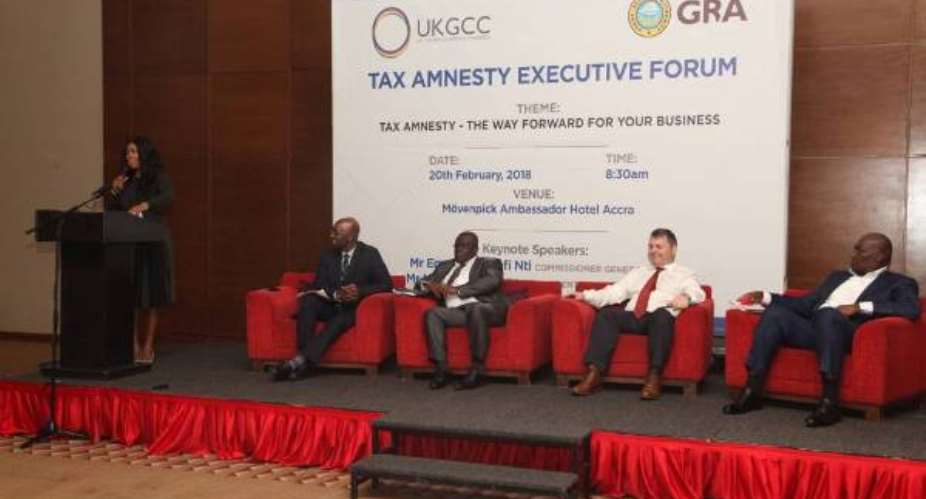Businesses have expressed mixed reactions to the new Tax Amnesty policy being implemented by the Ghana Revenue Authority (GRA).
Some have cast doubt over the policy's ability to reduce tax evasion while others believe the policy could increase tax compliance.
The concerns were raised at a session on the relevance of the Tax Amnesty Law on businesses by the UK Ghana Chamber of Commerce on Tuesday, February 20, 2017.
Passed in December 2017, the tax amnesty bill seeks to improve voluntary compliance among taxpayers.
Under the law, defaulting businesses will be allowed to pay a revised tax obligation that they had been in default for a period of time.
The current law is expected to last for nine months; between January to September 2018.

Henry Yentumi – Technical Advisor to the Commissioner General
The Technical Advisor to the Commissioner General, Henry Yentumi explained to Citi Business News, the scope of compliance they are seeking at the end of the period.
“First is to set the base line, we must come out in terms of our taxpayer numbers, the revenue that we expect which is also part of the thinking of promoting the amnesty as well as scheduling the various processes including the guidelines.”
This year's amnesty period will be third time that the GRA has implemented the policy over the last decade.
Businesses demand critical feedback
For the CEO of the Private Enterprise Federation, Nana Osei Bonsu, the absence of the outcome of a similar exercise carried out in 2013, is likely to impact on the objective this time around.

Nana Osei Bonsu – CEO, PEF
“If we are going to do this time around, let's review from the businesses' perspective; why did you fail to comply, what happened to you; how is the situation affecting you, etc. because that is the area where we can actually bring value as voluntary tax compliance limits the cost of tax administration,” he stated.
Meanwhile a Tax Consultant with Ernst and Young, Isaac Nketiah Sarpong also explains that knowing the reasons for the non-compliance should help identify further mechanisms to correct the trend.
“The OECD reported somewhere in 2016 that only sixty – nine companies actually showed up to be registered when the Amnesty was passed in 2013. But as at now, we do not know how much came into the kitty as a result of the amnesty so these are things that I think should have been number one on the board of the GRA.”
GRA to resolve concerns soon
Reacting to these concerns, Mr. Yentumi stressed that the outcome should be produced as soon as possible which will influence the outcome of the existing amnesty rules.
“GRA is still working on not just administrative guidelines but still looking forward to what kind of information was available from the previous tax amnesty issued in 2013. But admittedly the information has not been readily available and there have been some slowness in getting some of these things out,” he explained.





 Tuesday’s downpour destroys ceiling of Circuit Court '8' in Accra
Tuesday’s downpour destroys ceiling of Circuit Court '8' in Accra
 SOEs shouldn't compromise on ethical standards, accountability – Akufo-Addo
SOEs shouldn't compromise on ethical standards, accountability – Akufo-Addo
 Father of 2-year-old boy attacked by dog appeals for financial support
Father of 2-year-old boy attacked by dog appeals for financial support
 Jubilee House National Security Operative allegedly swindles businessman over sa...
Jubilee House National Security Operative allegedly swindles businessman over sa...
 Nobody can order dumsor timetable except Energy Minister – Osafo-Maafo
Nobody can order dumsor timetable except Energy Minister – Osafo-Maafo
 Mahama wishes National Chief Imam as he clock 105 years today
Mahama wishes National Chief Imam as he clock 105 years today
 J.B.Danquah Adu’s murder trial: Case adjourned to April 29
J.B.Danquah Adu’s murder trial: Case adjourned to April 29
 High Court issues arrest warrant for former MASLOC Boss
High Court issues arrest warrant for former MASLOC Boss
 Align academic curriculum with industry needs — Stanbic Bank Ghana CEO advocates
Align academic curriculum with industry needs — Stanbic Bank Ghana CEO advocates
 Election 2024: We'll declare the results and let Ghanaians know we've won - Manh...
Election 2024: We'll declare the results and let Ghanaians know we've won - Manh...
